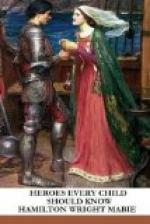The King met with many such encounters amidst his dangerous and dismal wanderings; yet, though almost always defeated by the superior numbers of the English, and of such Scots as sided with them, he still kept up his own spirits and those of his followers. He was a better scholar than was usual in those days, when, except clergymen, few people learned to read and write. But King Robert could do both very well; and we are told that he sometimes read aloud to his companions, to amuse them, when they were crossing the great Highland lakes, in such wretched leaky boats as they could find for that purpose. Loch Lomond, in particular, is said to have been the scene of such a lecture. You may see by this, how useful it is to possess knowledge.
At last dangers increased so much around the brave King Robert, that he was obliged to separate himself from his Queen and her ladies. So Bruce left his Queen, with the Countess of Buchan and others, in the only castle which remained to him, which was called Kildrummie, and is situated near the head of the river Don in Aberdeenshire. The King also left his brother, Nigel Bruce, to defend the castle against the English; and he himself, with his second brother Edward, who was a very brave man, went over to an island called Rachrin, on the coast of Ireland, where Bruce and the few men who followed his fortunes passed the winter of 1306. In the meantime the castle of Kildrummie was taken by the English, and Nigel Bruce, a beautiful and brave youth, was cruelly put to death by the victors. The ladies who had attended on Robert’s Queen, as well as the Queen herself, and the Countess of Buchan, were thrown into strict confinement.




